Kenya: Sad Tale of Somali Refugees
By Arianna Azzolini
 Dadaab, Kenya--- There is a forgotten dusty town populated by forgotten men and women fleeing the war, where dependency is the daily bread and hope does not exist. We are at Dadaab , the biggest refugee camp in the world which is composed of three minor camps-- Ifo, Hagadera and Dagahale.
Dadaab, Kenya--- There is a forgotten dusty town populated by forgotten men and women fleeing the war, where dependency is the daily bread and hope does not exist. We are at Dadaab , the biggest refugee camp in the world which is composed of three minor camps-- Ifo, Hagadera and Dagahale.
Over 300,000 people, mostly of Somali origin, are living in precarious conditions at the limit of human decency. After a long journey, often on foot, from Somalia to Kenya, the refugees wait at the border starving for even a week without food until they are transferred to the camps. Families crippled by war are given a card to collect the food, provided by the World Food Programme (WFP) and distributed to refugees by CARE.
To get the food ration itself is a nightmare as it entails standing in long unwinding queues for hours in the scorching sun.
"The food ends on the tenth day”, screams an elderly woman in a row." They let us die of hunger " , she continues.
But due to the harsh living conditions in the camps, some refugees opt to sell part of the food ration in order to meet other basic needs. Because of overcrowding, many families are forced to share cramped and insufficient resources in this inhospitable desert. The camp now hosts three times the number of refugees for which it was designed nearly twenty years ago and still over 5,000 people are arriving every month from Somalia.
During this year the opening of a new extension is scheduled. This would bring to four the number of sub-camps-- Hagadera, Dagahale, Ifo and Ifo 2 (the extension).
"The agencies do not help. We are given only little and poor quality food”, is the sentence that everybody is repeating. "Neither do they provide materials for building shelters so we struggle to build using branches, canvas, plastic and mud.”
Some people have lived for almost twenty years without electricity, without water and hope in their shelters. Many children were born here and some of them have already become adults.
"My daughter has heart problems and the hospital is giving her paracetamol. Staff responds to my complaints that I am not the doctor ", says Amina, a young Somali who cries desperately. "I have lived with my 2 daughters sharing everything with a family of strangers for 9 months. “The Lutheran World Programme (LWP), responsible for the allocation of living space, does not gives us a place to stay and every morning I go to cry in their offices”, she continues . “I do not have 30 euros needed to buy bricks to build a house, neither a husband who can do it. Mine was killed in Somalia. "
Another woman narrates her ordeal: "One day I brought my mentally challenged daughter to the hospital. There she has been sexually abused by a GTZ doctor and all my complaints fell on deaf ears. The result of this sexual violence is a one-year old child and my daughter has now been marginalised by the community for having a child outside wedlock. Stones are thrown at her when she goes to fetch water. I want the world to know what happens to Dadaab refugees”.
Meanwhile the European Community allocates to UNHCR tens of millions of euros each year as funds for the refugees. In 2009, it allocated 10 million while in 2010, 15 million euros was allocated.
It is a fact that a new residential area in western style complete with every comfort was recently built in the compound of the United Nations. There is also a tennis court, not to mention the beautiful restaurant called pumzika famous for parties and rivers of beer in the evening.
Article 13 of the Declaration of Human Rights is violated; refugees are denied the freedom of movement outside the camp unless in possession of a special permit obtained in five months by very few people. Those who try to escape are jailed. The refugees speak of open-air prison and call themselves “animals in a cage”.
It is worrying to know that the violations are tolerated by those who promoted in December of 1948 the Universal Declaration of Human Rights--the United Nations, whose High Commissioner for Refugees António Guterres visited the camps not more than a week ago. Despite his visit, it is business as usual.



